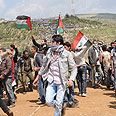
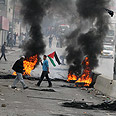

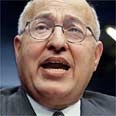
Palestinian activists are calling it a preview of new tactics to pressure Israel and win world support for statehood: Masses of marchers, galvanized by the Arab Spring and brought together by Facebook, descending on borders and military posts - and daring Israeli soldiers to shoot.
It could prove more problematic for Israel than the suicide bombings and other deadly violence of the past - which the current Palestinian Authority leadership feels only tainted their cause.
After attempted border breaches from Syria, Lebanon, Jordan and Gaza left 15 Palestinians dead Sunday, Israeli officials openly puzzled over how to handle an unfamiliar new phase.
"The Palestinians' transition from terrorism and suicide bombings to deliberately unarmed mass demonstrations is a transition that will present us with difficult challenges," said Defense Minister Ehud Barak.
Sunday's protests were driven by renewed hopes that Palestinian statehood - at least as an internationally approved idea within specific borders - is approaching after years of paralysis.
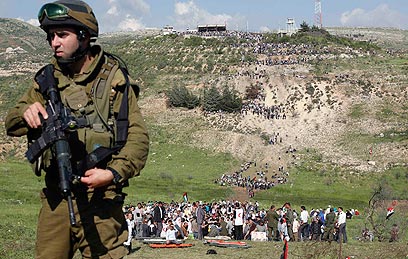
Syrians approaching Israeli border (Photo: Reuters)
The optimism is fed by reconciliation efforts between the Islamic militant Hamas and the Western-backed Fatah movement after a four-year split, as well as growing international support for Palestinian President Mahmoud Abbas' plan to seek UN recognition of a state in the West Bank, Gaza and east Jerusalem in September over Israel's objections.
Although some say UN recognition will change little on the ground, the pro-democracy revolts in the Arab world have instilled a new sense of possibility among Palestinians, who had been dejected after two failed uprisings against Israeli rule and fruitless peace talks over the past 20 years.
Facebook generation
Meanwhile, the Facebook generation is increasingly taking a lead in the Palestinian arena, at times sidelining political veterans stuck to more traditional ways.
"There is a new energy, a new dynamism," said Hanan Ashrawi, a former Palestinian negotiator. "The Palestinians feel they have put themselves on the map again."
Sunday's marches occurred on the day Palestinians mourn Israel's 1948 creation, when hundreds of thousands of their people were uprooted and scattered throughout the region.
Marking the anniversary, called the "nakba," Arabic for "catastrophe," Palestinian organizers bused hundreds to Lebanon's border with Israel and to the Syrian frontier in the Israeli-held Golan Heights.
Surprised and overwhelmed, Israeli troops fired to keep the crowds from breaching the borders. Four Palestinians were killed in the Golan and 10 in Lebanon, while a 15th was fatally shot as dozens rushed Israel's border wall with the Gaza Strip.
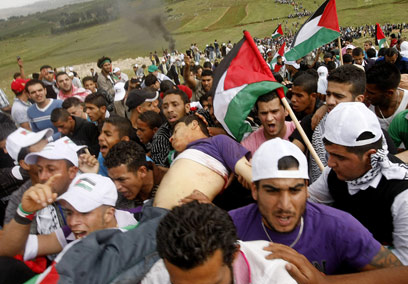
Carrying wounded man in Maroun al-Ras (Photo: AFP)
It's unclear whether future calls for more mass marches will produce a similar turnout since Sunday's casualties underscored the heavy risks.
However, Palestinian activists in recent months have spoken of employing such tactics throughout the West Bank, the core of a hoped-for future Palestinian state.
Some in Israel suspected that allies of arch-foe Iran, including the Lebanese Hezbollah militia, had a hand in the border breaches or that Syria helped instigate them to divert attention from its brutal crackdown on domestic unrest. In Lebanon's border area, Hezbollah activists with walkie-talkies directed buses and handed out Palestinian flags.
However, the Palestinians say it was purely their initiative, launched on Facebook several months ago, with heavy involvement by expatriates. "No one expected it to work, and it did work," said Hazem Abu Hilal, a Palestinian organizer.
Watch Syrians cross border into Israel
Palestinian officials quickly embraced the campaign as a boost for their three-pronged strategy - seeking UN recognition, building a state from the ground up and fostering nonviolent protests.
Abbas declared a three-day mourning period for Sunday's dead, and flags were lowered to half-staff. "You assert to everyone that ... peoples' wills are stronger than their oppressors," he said in a televised speech, addressing the protesters.
'Palestinians motivated by Arab uprisings'
Nabil Shaath, a Palestinian negotiator, said he believes Sunday's marches were just a hint of what's to come.
"These people are motivated now by the revolutions that succeeded in the Arab world, and I don't think anybody can stop them," said Shaath, speaking from Slovenia, where he was trying to add one more country to the list of dozens who have already recognized a Palestinian state in principle.
Although they now claim inspiration from other Arab rebellions, the Palestinians were among the first in the Arab world to launch a popular uprising. In the late 1980s, they challenged Israeli military rule with mass marches, rock-throwing protests and general strikes, laying the groundwork for negotiations that led to interim peace deals with Israel, included self-rule in parts of the occupied areas.
The second uprising, a decade later, was typified by shooting attacks and suicide bombings which killed many hundreds of Israelis. The violence eroded much of the worldwide sympathy for the Palestinians and triggered Israeli countermeasures which killed thousands of Palestinians.
"This is what put us on the contemporary map, unarmed people facing a brutal occupation," Ashrawi said of the first uprising. "Now again, it is evident that this kind of resistance not only gets you the moral high ground, but also exposes the immorality of the occupation."
Ex-general Yossi Peled, who commanded Israeli troops on the Lebanese and Syrian borders, said border breaches will likely be attempted again and must be stopped at any cost - regardless of the political fallout - because they pose a direct challenge to Israel's sovereignty.
"Yesterday's promo leaves us little time to draw the conclusions and come up with a new method of warfare where Israel will confront unarmed civilians, children and women," he said.
Alon Liel, a veteran Israeli diplomat, said the momentum is with the Palestinians. "This is a new type of enthusiasm around Palestinian nationalism, tied to the expectations in September," he said.
- Follow Ynetnews on Facebook















